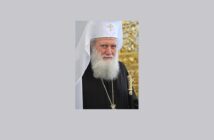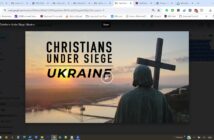Source: Peter Anderson, Seattle USA
On November 17, Ilze Brands Kehris, who is the United Nations’ Assistant Secretary-General for Human Rights, made a presentation at a session of the Security Council which was discussing the issue of freedom of religion in Ukraine. The complete text of her presentation can be read in English at (link). Aside from the High Commissioner and the Deputy High Commissioner, Ms. Brands Kehris is the highest official of the United Nations’ Office of the High Commissioner for Human Rights (OHCHR). (link) In her presentation, Ms Brands Kehris was highly critical of certain actions by Russia against churches in the occupied territories. She also criticized Ukraine. She devoted two paragraphs to Draft Law 8371, which has been approved on the first reading by the Ukrainian Parliament (Rada). The Draft Law is now with the Rada’s Committee on Humanitarian and Information Policy, which is considering amendments proposed by Rada deputies to the Draft Law and which will present to the Rada for the second reading a draft law incorporating the amendments which the Committee finds appropriate.
Ms. Brands Kehris in her remarks about Draft Law 8371 extended an express invitation to Ukrainian lawmakers to make use of the expertise of the OHCHR “to assess whether the proposed means are clearly defined and the least intrusive ones possible for achieving the specific aim, and whether the proposed amendments comply with international legal standards.” One of the functions of the OHCHR is to work with and assist “Governments in fulfilling their human rights obligations.” (link) According to Ms. Brands Kehris, Ukraine has previously used the services of the OHCHR with respect to other laws.
In my opinion this invitation presents an important choice for Ukraine. If the Rada has confidence that Draft Law 8371 complies with international standards relating to freedom of religion, one would think that it would accept this invitation. A conclusion by the OHCHR that Draft Law 8371 now complies with international standards relating to freedom of religion would be an extremely powerful weapon for Ukraine in rebutting accusations that the Draft Law fails to meet these standards. In contrast, a non-acceptance of the express invitation leaves one wondering why the Rada did not accept. One conclusion is that the Rada wishes to rush ahead and approve this law and does not wish to hear any objections from the OHCHR with respect to the latest version of Draft Law 8371. I believe that not accepting the invitation from the United Nations will hurt Ukraine in the eyes of the world. It will also provide an additional argument to Russia.
In considering this latest development, it is helpful to review the events leading up to it. On October 19, the Rada approved on the first reading Draft Law 8371 by a vote of 287 in favor, 15 opposed, and 2 abstaining. A considerable number of the deputies were not at the Rada for the vote. After the vote, various organizations and individuals engaged in a campaign to make known on the Internet and in the media the names of the 15 deputies who voted against the Draft Law. Deputies had until November 11, two weeks from the first reading, to submit proposed amendments to the Draft Law. According to Yevgenia Kravchuk, deputy head of the Rada’s Committee on Humanitarian and Information Policy, 1,200 amendments have now been submitted to the Committee by deputies. (link) She said that two-thirds of these proposals have “signs of spam,” apparently a reference to suspected efforts by opponents of the Draft Law to slow the legislative processes. According to Kravchuk, some of the members of the Committee have submitted amendments for “ensuring that there are no protracted court procedures” in enforcing the Draft Law. Some members of the Committee “were co-authors of other similar draft laws and submitted their amendments in order to integrate the best ideas from them into the government project.” Kravchuk stated that the Committee wants “to prepare this draft law for consideration in the session hall of the parliament by the end of this year, if there is such an opportunity.”
I have heard of no efforts by proponents of Draft Law 8371 to submit amendments which define critical words or phrases used in Draft Law 8371. To the best of my knowledge, Viktor Yelensky, who is the top official of the Ukrainian government with respect to religious affairs and who was probably the main drafter of Draft Law 8371, has not publicly commented on the subject of definitions. Significantly, Ms. Brands Kehris in her invitation to Ukrainian lawmakers urged them “to assess whether the proposed means are clearly defined….” The World Council of Churches in a letter to the speaker of the Rada stated that “without proper definition and limitations, this law [Draft Law 8371] could be used in ways that violate international norms of religious freedom or belief…” (link) Soon after Draft Law 8371 was submitted to the Committee, the Committee referred it to the Rada’s scientific–expert department for an opinion. The scientific-expert department concluded that the key language of Draft Law 8371 is ambiguous, does not satisfy the requirements of legal certainty, and needs definitions. (link)
In previous newsletters, I have focused on the ambiguity of the key language of Draft Law 8317. There are two possible interpretations of this language, each of which would lead to drastically different results. Again, the critical language is the following: “Activities of religious organizations that are affiliated with the centers of influence of a religious organization (association), the governing center (control) of which is located outside of Ukraine in a state that carries out armed aggression against Ukraine, are not allowed.” If one interprets the phrase “centers of influence of a religious organization” to refer to the Moscow Patriarchate, the key question becomes whether the Ukrainian organization is “affiliated” with the Moscow Patriarchate. If one interprets the phrase “centers of influence of a religious organization” to refer to the Ukrainian Orthodox Church (UOC), the key question becomes whether the UOC has its “governing center (control)” in Russia. It is my strong belief that prohibiting the activities of the UOC based on a mere affiliation with the Moscow Patriarchate, without proof that the UOC is now in fact being controlled by the Moscow Patriarchate, would be a violation of the international norms of freedom of religion. On the other hand, if the Moscow Patriarchate is now in fact managing and controlling the activities of the UOC, prohibition of those activities might be very well lawful especially when the control is being exercised to promote Russian objectives in the current war.
There is a real concern that the Ukrainian government seems to be adopting the first interpretation. In the session of the Security Council on November 17, the spokesperson for Ukraine was Natalia Moudrenko. The entire proceedings of the session can be watched in English at (link). Ms. Moudrenko’s remarks concerning Draft Law 8371 begins at 1:29:50 in the video. Reading a prepared text, Ms. Moudrenko stated Draft Law 8371 “will disallow the activities of those religious organizations in Ukraine that are affiliated with the main bodies in the aggressor county.” In addition, Viktor Yelensky stated in an interview on October 27: “The draft law refers to the prevention of activities in Ukraine of religious organizations that are related to centers of influence in the country that carries out aggression against Ukraine.” (link) In neither of these two statements is there a reference for a need by the government to prove that an organization in Russia is at the present time managing and controlling in fact the activities of the religious organization in Ukraine. Mere affiliation or a relationship would be enough.
When the National Security and Defense Council of Ukraine directed on December 1, 2022, that a draft law, which is now 8371, be prepared , it specified that the draft law must be “in accordance with the norms of international law in the field of freedom of conscience.” There are now very sound and real fears that the present version of Draft Law 8371, especially as interpreted by the Ukrainian government, violates those “norms of international law in the field of freedom of conscience.” Those fears would be largely dispelled if the Rada accepts the invitation of the UN’s OHCHR to work with it in framing a version of Draft Law 8371 which will comply with the norms of international law.
Peter Anderson, Seattle USA




